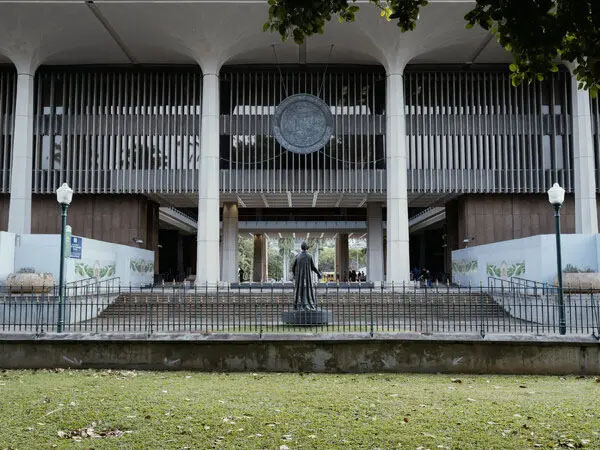Honolulu, Apr 19
For the better part of a decade, some of Hawaii’s most powerful people huddled together at late-night parties in a cramped second-floor office where lobbyists and executives seeking government contracts lined up to drop cash and checks into a metal lockbox.
That was the entry fee for these extraordinary political fundraisers. Inside the office, just a short walk from the state Capitol in downtown Honolulu, dozens of guests were served sushi prepared by professional chefs and unlimited beer and liquor.
At the end of the night, Wesley Yonamine, the host and a high-ranking airport official, would, together with the politicians, pop open the box and dole out campaign contributions according to a list of pledges obtained before each event.
As described by attendees, a typical party could bring in thousands of dollars in donations, giving some elected officials almost half their annual campaign haul in a single night.
Inside the Late-Night Parties Where Hawaii Politicians Raked In Money The legislature in session at the Hawaii State Capitol in Honolulu, March 5, 2024. After the state passed a law barring government contractors from donating to politicians, fundraising parties showed just how completely the reform effort failed.
It was not supposed to work this way. In 2005, in response to a series of scandals, Hawaii passed a law that barred government contractors from giving money to politicians. It was billed as one of the nation’s most ambitious efforts to end pay-to-play in contracting and designed to fundamentally change the political culture of a state steeped in corruption.
But legislators wrote a loophole into the law, effectively gutting it: The ban would apply only to donations from the actual corporate entities that got contracts, but not to their owners, employees or any related businesses.
Yonamine’s parties illustrated just how completely the reform effort failed.
Today, Hawaii is reeling from its latest government corruption scandal, with state officials accused of taking bribes from Milton Choy, a prominent business owner who wore a wire for at least a year as part of a deal with the federal government.
But that is just one glimpse of the role money plays in politics here.
An examination of Hawaii’s contracting system by The New York Times and Honolulu Civil Beat offers a detailed look at the workings of a state known for favoritism and patronage, a culture where big companies with ties to politicians have historically dominated.
“Pay-to-play is woven into the DNA of the statehood of Hawaii,” said Camron Hurt, director of Common Cause Hawaii, a watchdog group. He pointed to the 1893 overthrow of the Hawaiian Kingdom that led to an “oligarchy” of business owners, sugar barons and large landowners lasting decades. The industries involved had close ties to the ruling political parties well into the 1960s and 1970s, when Hawaii’s campaign finance regulations were written.
A Times and Civil Beat analysis of campaign donations and contracts found that since 2006 — the year the pay-to-play law went into place — people tied to government contractors have provided a remarkable percentage of the money fueling state and local politics. They have given state and local Hawaii politicians more than $24 million: about one-fifth of all donations made. Of that total, $6 million has come from people tied to just 15 companies.
Most donors rarely mentioned their employers in public records designed to bring transparency to political donations. But the Times and Civil Beat, reviewing hundreds of thousands of campaign records, linked more than 28,000 of the donations to contractors.
The analysis almost certainly captured only some contributions, in part because the state could not provide a full list of contractors. In fact, record keeping is so poor that some vendor information is collected only on paper, while electronic records are riddled with errors.
Several of the state’s biggest agencies did not respond to repeated requests for financial records or said they could not find them.
The examination found more than a dozen examples over the past six years of people tied to contractors donating to political campaigns in the months before key decisions led to deals.
Some of the elected officials who could crack down on favoritism are themselves benefiting from the lack of oversight. At least a dozen legislators have worked for or co-owned companies that won state contracts, some profiting in ways that have not been previously reported.
The Times contacted every politician and campaign donor named in this article. Most of those who responded said there was no link between campaign donations and the contracts they won.
Yonamine acknowledged hosting the fundraisers but declined requests for a detailed interview. In a brief statement, he denied influencing any contract awards and said he was “raised to give back to the community.”
“It’s what drove me to work in public service for 36 years,” he said. “Helping those seeking elected office by supporting their fundraisers is an extension of these values and an important aspect of civic engagement afforded citizens under the law.”
Political donations are regulated by the Hawaii Campaign Spending Commission, which has a staff of just five people who are responsible for tracking tens of millions of dollars in campaign contributions.
Gary Kam, the commission’s general counsel, acknowledged that the law restricted only a small portion of donations. Executives can give freely, and if bundled together, in greater amounts than if their company donated on its own. Expanding the law to cover those people is the “key to it all,” he said.



























